Healing Comes in Waves Podcast
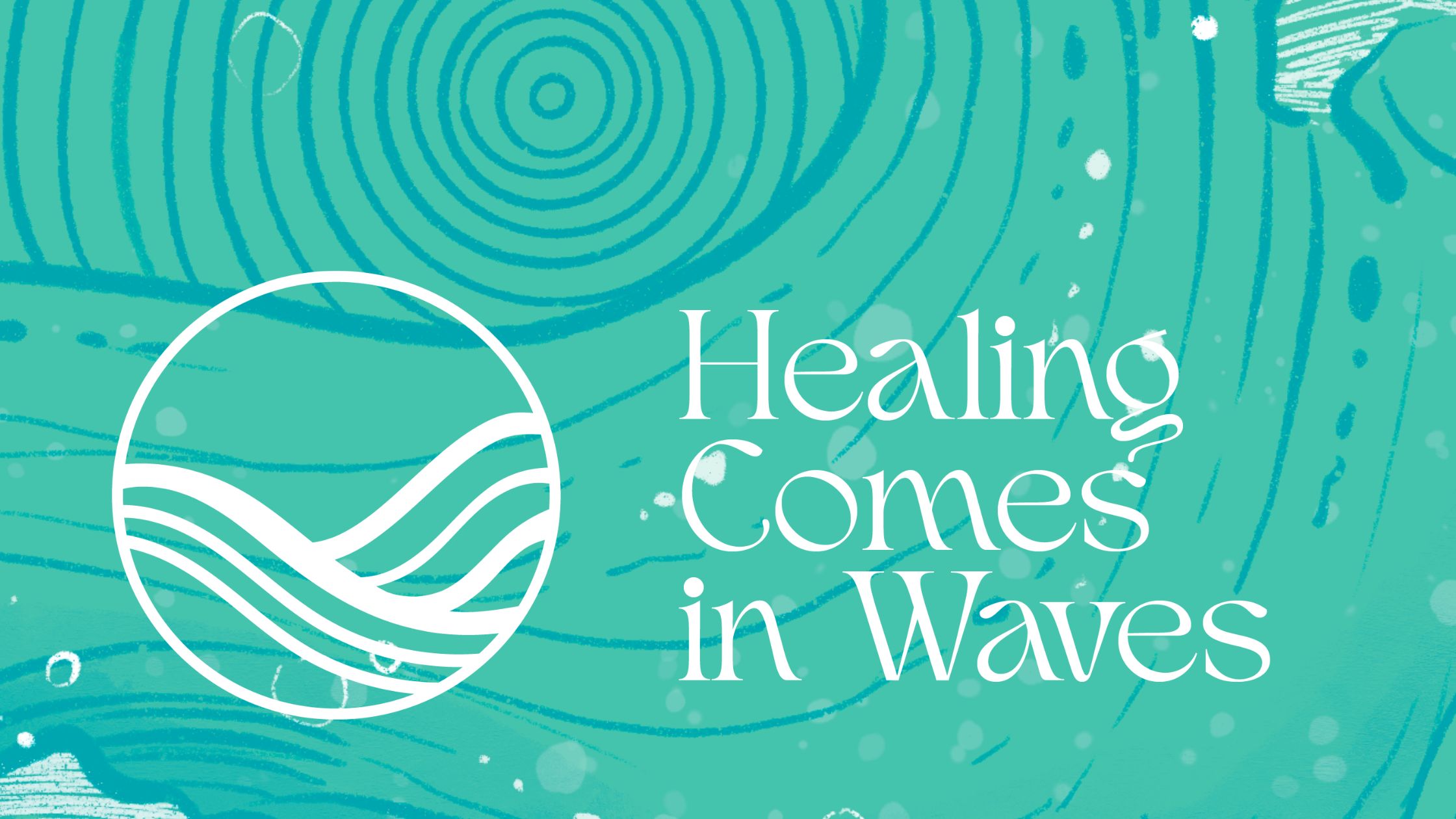
Healing Comes in Waves is a podcast for survivors to explore healing after harm. Too often, the conversation about sexual violence focuses on what was done to us but not how we choose to heal. It is hosted by Farrah Khan, manager of Consent Comes First. This season we talk to survivors, educators, and advocates about how to attend to feelings, make connections and figure out what justice means to us.
Healing Comes in Waves is a choose-your-own-adventure podcast, meaning you don’t have to listen in any specific order. Instead, you are encouraged to pick which subjects you want to explore. Healing comes in waves, with peaks and valleys, times of movement and times of stillness. We may not be able to stop the waves, but we can learn how to ride them. If you or someone you know needs support, check out Consent Comes First resources page.
Content Note: Although there are no descriptions of sexual violence in this podcast series, any conversation about sexual violence can bring up big feelings and be hard to hear. Listen in a way that feels safer for you. You get to choose.
Healing Comes In Waves is a collaborative project between Consent Comes First, the Office of Sexual Violence, Support and Education with the student leadership group Consent Action Team at Toronto Metropolitan University. Thank those student leaders for your brilliance, excitement, and expert advice. Also, thank you for consenting Comes First staff Jiaqing Wilson Yang, Fahamida Zahan, Lynn Nguyen, Tiffany Wong, Rena Kim, Corey Ramsey, Shamita Kumar, Farrah Khan and Grace Baric for all their work in making this podcast happen.
Produced by: Vocal Fry studios, an audio production studio dedicated to building a supportive, inclusive and innovative podcast industry in Canada.
Thank you to Vocal Fry’s Katie Jensen, Ren Bangert, and Michal Stein for the patience, compassion and care they gave our team throughout this project. We cannot thank them enough for the trauma-informed way they approached this work.
Healing Comes in Waves Episode Guide
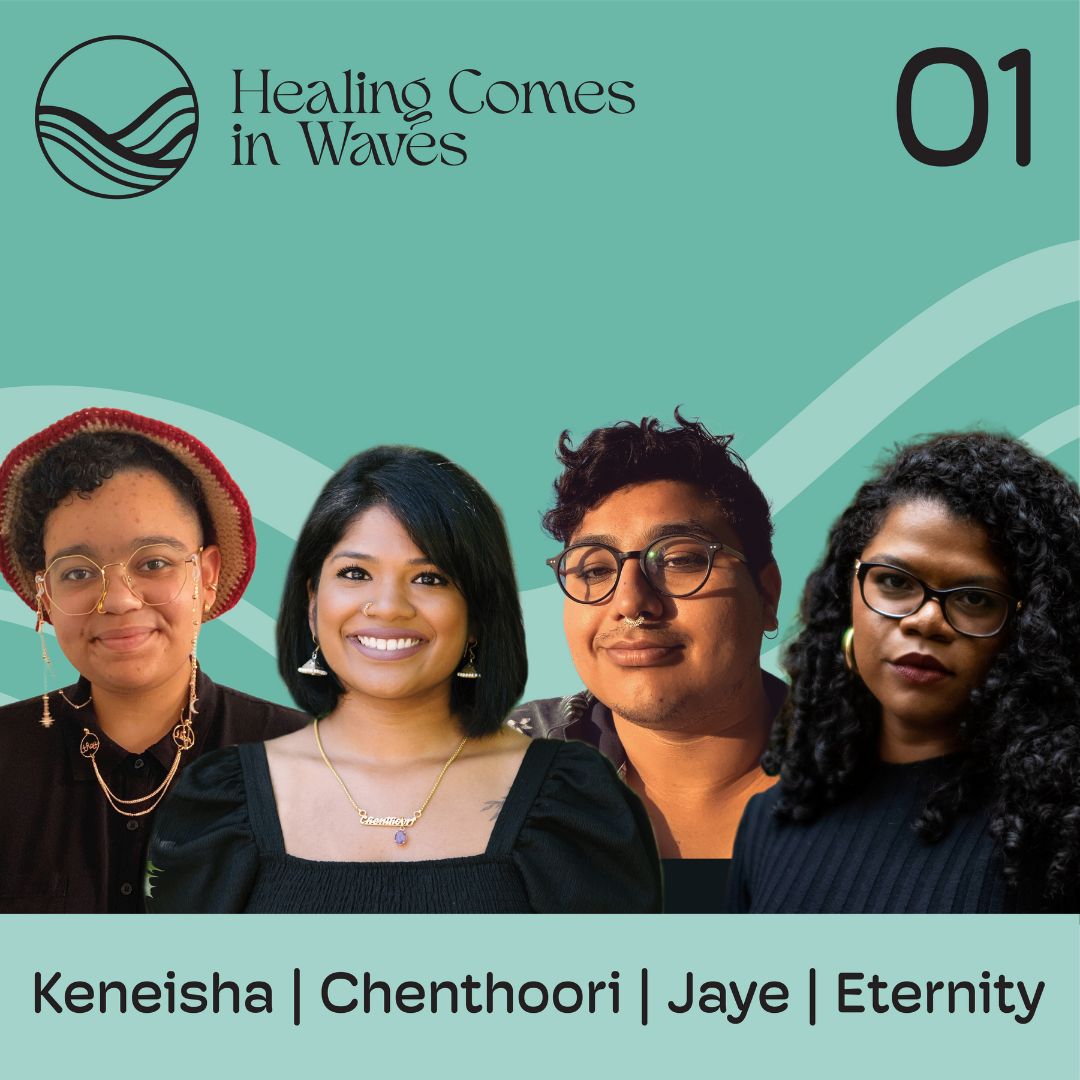
1. Trusting Yourself after Trauma
Sometimes, the first person we need to tell that we were sexually assaulted is ourselves. Too often, we can convince ourselves that it wasn’t “so bad,” that we can “handle it” or that it was somehow our fault. All of these are not true. In this Healing Comes in Waves episode, we are talking to Chenthoori Malankov-Milton, Jaye Garcia and Eternity Martis about understanding what it means to be a survivor and how that is different for everybody.
CONTENT NOTE:
Although there are no descriptions of sexual violence in this podcast series, any conversation about the topic can bring up big feelings and be hard to hear.
Listen in a way that feels safer for you. You get to choose.
“Me saying out loud to my younger self that it was never your fault. You were so courageous even during when it happened and after. I love you so much. And I am here holding you every step of the way, and now you're safe, you're safe. And you, you deserve joy. You deserve love, you deserve joy. And I care so much for you. To anyone who's listening, you're cared for. So sending big love waves of love, your way .“ - Chenthoori Malankov-Milton
Chenthoori Malankov-Milton (she/her) is a daughter of the Thamil Diaspora. She is a grassroots gender-justice advocate. She lives, works, and plays as a guest on the traditional territory of many nations, including the Mississaugas of the Credit, the Anishnabeg, the Chippewa, the Haudenosaunee, and the Huron-Wendat Peoples. Chenthoori is a Social Worker who incorporates a transformative healing justice framework and is committed to cultivating a better world for all marginalized communities. She enjoys spending time with her two pups in her spare time, practising yoga and smashing the patriarchy.
Jaye Garcia (they/them) is a fat, queer, gender non-binary, racialized person of colour with hidden disabilities, born and raised by Latinx refugee immigrants in Amiskwaciywaskahikan ("Beaver Hill House" in Cree; AKA Edmonton, AB). Jaye is eager to continue their journey as a settler-guest, living, (un)learning, and growing in Tkaronto. The year is 2023, and Jaye remains unapologetically fat, femme and fierce.
Keneisha Charles (they/them) is an organizer and artist who strives to dream and co-create liberation through all they do. As a fat, Black, queer, non-binary, autistic, second-generation Caribbean, intersectionality is at the heart of their praxis. Their community work centres around Black liberation, collective care, environmental justice, disability justice, queer-trans liberation, and gender equity. As a poet, storyteller, and musician, they’re also passionate about the role of art in revolution. Their present work with the Consent Action Team helped launch #HighSchoolToo, a national student-led network that works to end sexual violence in secondary schools. They’re currently completing a Bachelor of Social Work degree with a double minor in Caribbean Studies and Disability Studies at Toronto Metropolitan University.
Eternity Martis is an associate professor at the School of Journalism and Toronto Metropolitan University. She is also an award-winning journalist and editor whose work on race and gender has been featured in VICE, Chatelaine, Maclean’s, Flare, Salon, CBC, Hazlitt, The Walrus and many more. Her bestselling, award-winning memoir They Said This Would Be Fun: Race, Campus Life, and Growing Up, about being a woman of colour at a predominantly white university, won the Kobo Emerging Writer Prize for Non-Fiction and was named a “Best Book of 2020” by the Globe and Mail, Chapters/Indigo, Audible and Apple.
Her writing has helped newsrooms, including The Review of Journalism, Xtra, the Toronto Star, and tvo.org change their style guides to capitalize “Black” and “Indigenous,” and her writing has been taught on academic syllabuses at North American and Caribbean universities. Following a petition by journalism graduates at TMU University for more diverse courses in light of the murder of George Floyd, Eternity developed and teaches “Reporting On Race: Black Communities and the Media” at Toronto Metropolitan University’s School of Journalism, the first course of its kind in Canada.
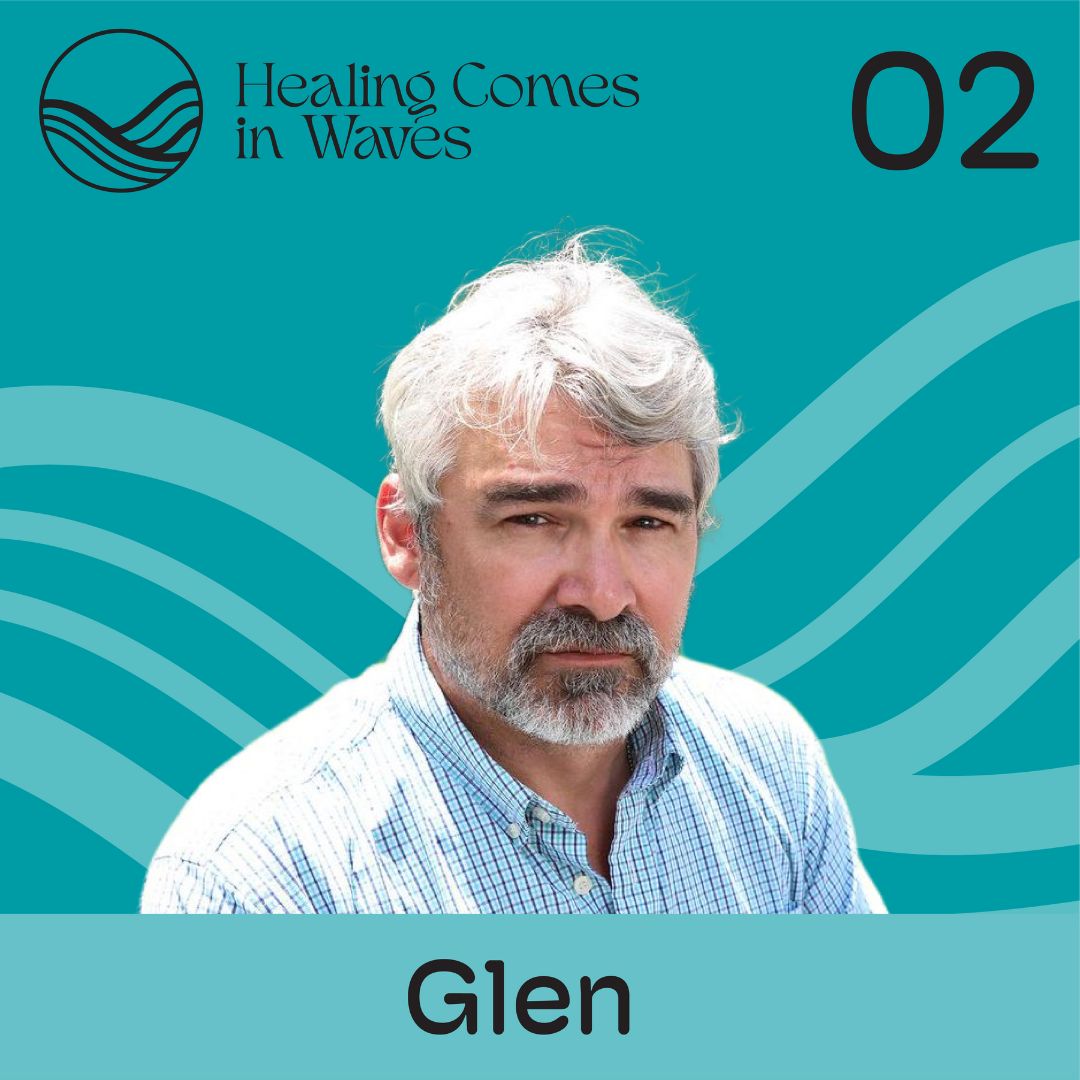
2. Supporting a Survivor as a Parent with Glen Canning
In this episode, we explore with advocate Glen Canning how parents can support their children when they disclose, the impacts of intergenerational trauma, check our own internal biases and discuss ways we can attend to our needs as child sexual abuse survivors.
Glen is a survivor of child sexual abuse and the father of the late Rehtaeh Parsons. Rehtaeh was a powerhouse young woman who fought for a better world. She died by suicide on April 4th, 2013, following months of cyber abuse and victim blaming connected to the sexual violence she was subjected to.
CONTENT NOTE:
There are no descriptions of sexual violence in this podcast series. In this episode, there is a discussion of the impact of child sexual abuse, suicide and sexual assault. This can bring up big feelings and be hard to hear. Listen in a way that feels safer for you. You get to choose.
“You're going to have a lot of emotions, but the very most important thing, I believe for a parent to do once a child has this close to them is make sure that your child knows that you love them no matter what. Make sure that you tell them that they are safe. Right now, they're safe with you. And let them know very much that whatever it is that happened, it wasn't their fault. Don't blame themselves. It wasn't their fault.” - Glen Canning
Glen Canning is an advocate for victims of sexual assault. He is the father of Rehtaeh Anne Parsons, a Nova Scotia teenager who four males sexually assaulted at a home near Halifax in November 2011. Rehtaeh ended her life on April 4th, 2013, following months of cyber abuse and victim blaming. Glen has spoken about Rehtaeh’s case internationally and across Canada. Along with his daughter’s mother, Leah Parsons, he has helped bring about changes to the Criminal Code of Canada. Glen and Leah, along with Amanda Todd’s mother, Carol, for his work, received the Rosalind Prober Award for Advocacy in 2013 and was named one of Huffington Post Canada’s Top 50 Contributors. Learn more about Glen Canning and his work at his website: https://www.glencanning.com.
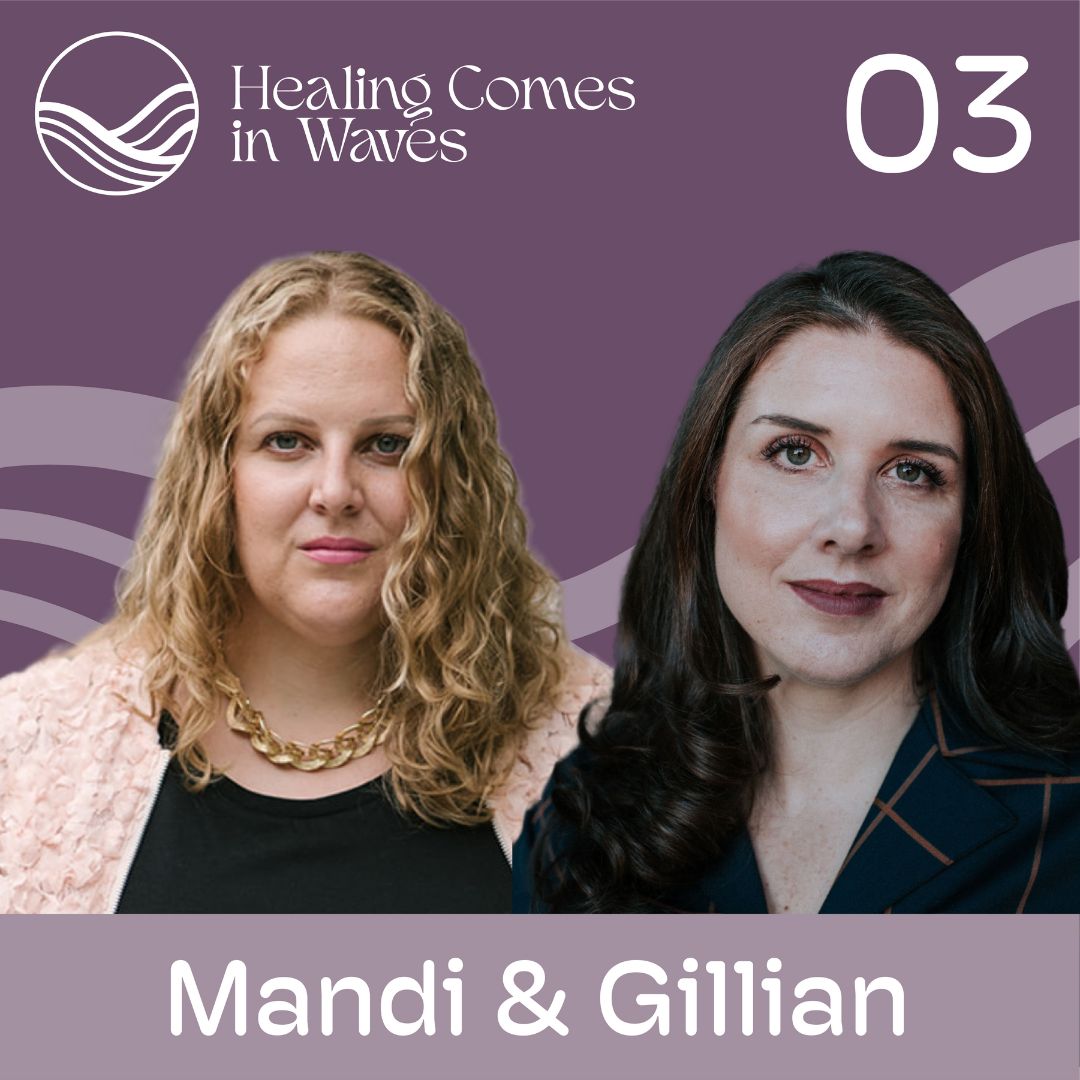
3. Navigating the Legal System.
In this Healing Comes in Waves episode, we talk to lawyer Gillian Hnatiw and feminist academic Mandi Gray about accessing the criminal and civil legal system. Reporting to the police and going through the legal system is one of many options survivors can choose from. This episode is an opportunity to learn more about the legal process and decide what works for you. Remember: whatever choice you make, it’s your decision.
CONTENT NOTE
There are no descriptions of sexual violence in this podcast series. In this episode, there is a discussion of navigating the legal system from the perspective of a lawyer and a survivor. This can bring up big feelings and be hard to hear. Listen in a way that feels safer for you. You get to choose.
“I would say that the system is not about you. It's not built for you, it's not designed to recognize your trauma or pain. It's not designed to weigh your evidence in a neutral way. And so don't take on the labels generated by a fixed system; you have to almost disconnect yourself from it. You know what happened to you and you know, the criminal legal system is a system that's designed to weigh evidence in a very particular way that sort of conforms to the rigours of the Constitution and to make findings of guilty or not guilty. ”
-Gillian Hnatiw
Gillian Hnatiw is a feminist lawyer practicing in Toronto. She is an expert in gender-based violence and her law firm, Gillian Hnatiw & Co., specializes in claims arising from sexual, physical and psychological abuse, harassment and assault and well as from the non-consensual taking and sharing of intimate images. Gillian strives to empower her clients through a variety of legal and restorative processes and to center their personal needs and goals.
Gillian is the former Chair of the Women’s Legal Education and Action Fund (LEAF), a non-profit legal organization which works to advance gender equality through litigation, law reform and public education. She regularly speaks at conferences and seminars on a wide range of topics. She is frequently sought out by industry and mainstream media for comments on sexual violence, professional regulation and accountability, diversity and gender equality issues.
Learn more at https://www.gillianandco.ca/
Dr. Mandi Gray is a Postdoctoral Fellow at the University of Calgary. She recently finished a book titled Liar Lawsuits: Sexual Violence and Defamation Law in Canada that will be released in 2023. Mandi has been a community-based advocate working with women and girls involved in the legal system since 2008. Her experience as a sexual assault complainant and activist shape her academic research. Connect with her on Twitter @gotmysassypants or on her website www.mandigray.com
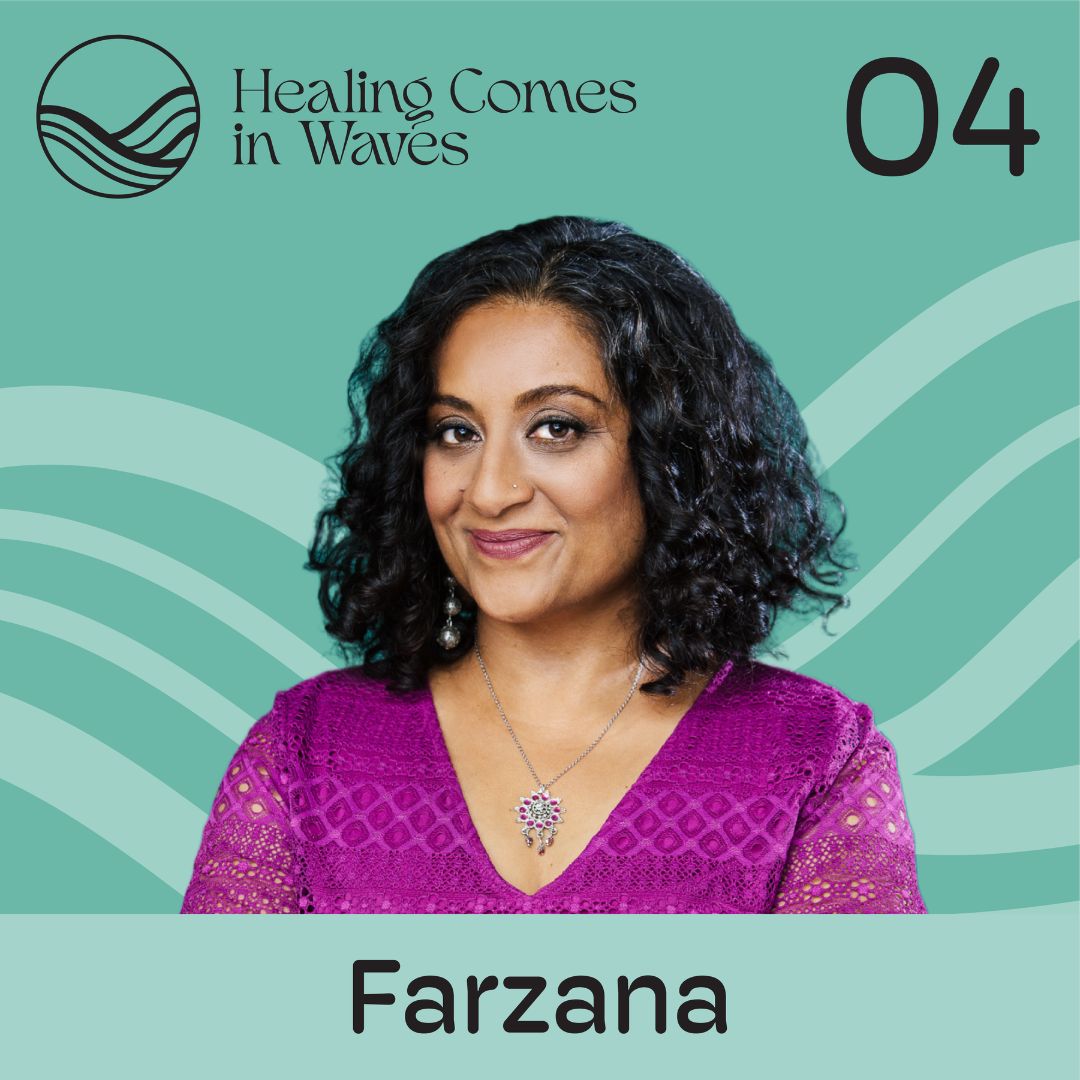
4. Accessing Counseling on Your Own Terms
In this episode, we talk about attending to the impacts of trauma and exploring accessing a counsellor with Farzana Doctor. You get to determine how you want to heal. One of the tools that you can access is counselling. It can help you understand the impacts of harm, build an understanding of what trauma is and explore tools for care. Counselling can sometimes sound like a magic bullet however it is one tool of many. This episode reminds us of the importance of finding a counsellor that is a good fit for you and be prepared to do the work in counselling.
CONTENT NOTE
There are no descriptions of sexual violence in this podcast series. In this episode, there is a discussion of healing from female genital mutilation. This can bring up big feelings and be hard to hear. Listen in a way that feels safer for you. You get to choose.
“Turning a compassionate gaze to the child inside of us that survived in that way, I think, is the first step. So often, we will judge ourselves and pathologize for all of the child-like protective responses we have to trauma. And instead, we want to see that all those responses were helpful at the time. They might not be helpful anymore, but they were helpful at the time.”
-Farzana Doctor
Farzana Doctor is a Tkaronto-based author, activist and Registered Social Worker Psychotherapist. She has published four critically acclaimed novels, including Seven, which Ms. Magazine described as “fully feminist and ambitiously bold”, and was shortlisted for the Trillium and Evergreen Awards. Her new poetry collection, You Still Look The Same, which Quill & Quire has called “a powerful and necessary collection that breaks silences” was just released in May 2022.
In her private practice, she works with individuals and couples and provides clinical consultation to other therapists. A founding member of WeSpeakOut and the End FGM Canada Network, she is also the Maasi behind Dear Maasi, a new sex and relationships column for FGM/C survivors. www.Linktr.ee/farzanadoctor
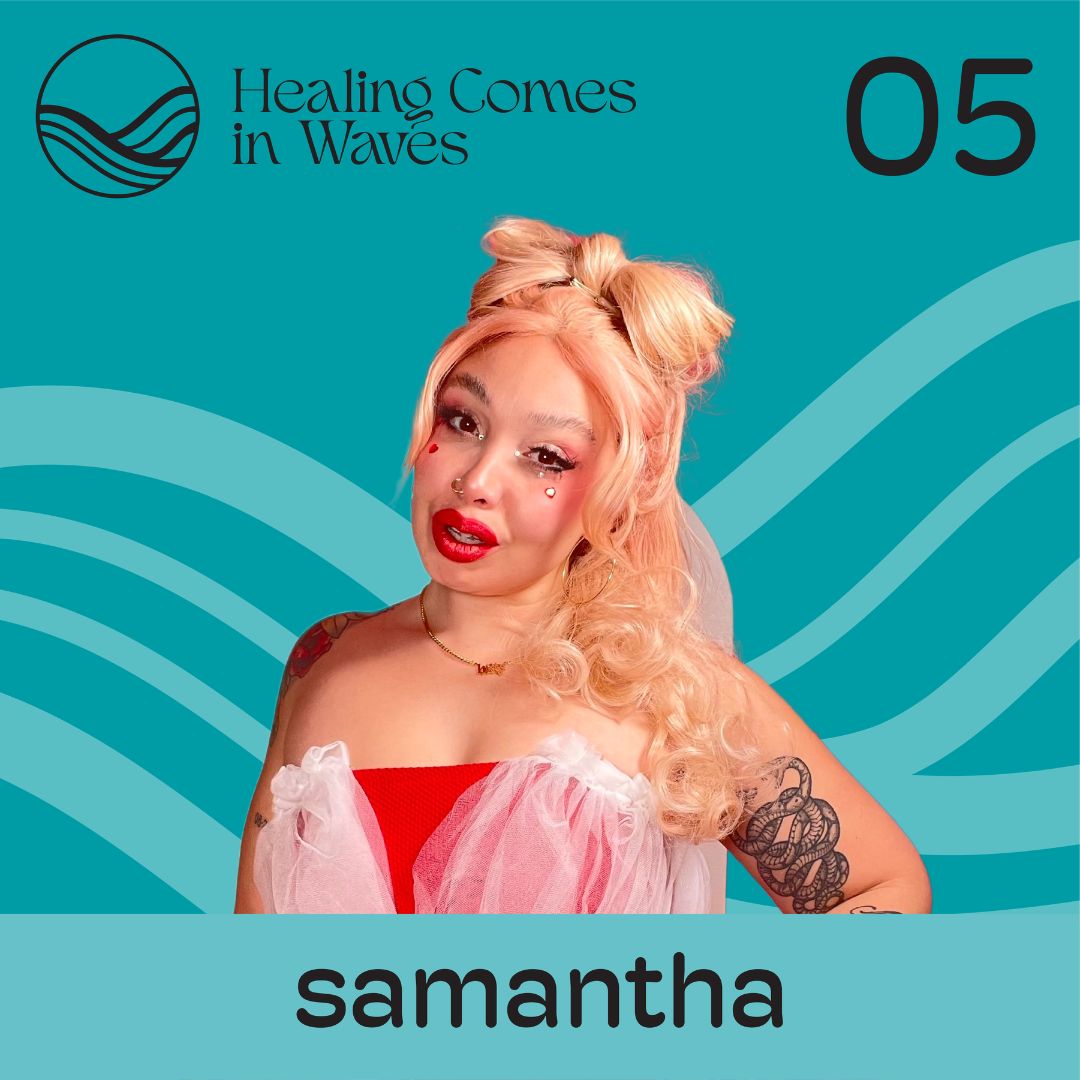
5. Cultivating Pleasure After Sexual Assault
In this episode, we talk about pleasure, sexual intimacy and healing with samatha bitty. Sexual violence deeply impacts our relationship with our bodies, pleasure and other people. There is no one way to reclaim pleasure and intimacy after harm. Having safe(r), trauma-informed conversations can help us see possibilities we did not know existed. This episode is a reminder of our right as survivors to joy.
CONTENT NOTE:
There are no descriptions of sexual violence in this podcast series. In this episode, there is a discussion of intimacy and survivorship. This can bring up big feelings and be hard to hear. Listen in a way that feels safer for you. You get to choose.
“It starts with that self-awareness of What do I need? How do I want to feel? What does feeling safe look like? Right? It's the before the during and the after plan, right? So it's like before. It's like, I need to have clear boundaries. We need to talk about what I feel comfortable with going in during. It's like we need to have either like a safe word or a plan to get grounded because to let's not forget that like as survivors, it's not like we're never partnering with other survivors, right? Like, we want to avoid getting into a trigger spiral or like a cycle of that. So it's like, OK, how do we ground each other, right? This is mutual. This is a co-creation.”
-samantha bitty
samantha bitty (she/her) is an award-winning educator, speaker, certified Emotional Intelligence coach and social change entrepreneur with a background in clinical, institutional and independent sexual health education, gender-based violence prevention, front-line interventions, anti-racism/anti-oppression work and project management for public art.
Having laughter, empathy and liberation as central pillars of her work, she aims to facilitate creative educational spaces, that can fill the gaps often left by traditional models of learning. samantha is passionate about changing the ways communities access education, art, and resources.
samantha is the founder of the Inner Development Project, is a regular contributor to Global News, CBC, iHeartRadio, Slice…, and is represented by the National Speakers Bureau. She has developed and facilitated workshops, keynotes, seminars, learning sessions and training for various groups and institutions, both locally and internationally.
Based in Tkaronto (Treaty 13 territory), samantha comes to this work as a first-generation immigrant of mixed Afro-Caribbean/settler Northern European descent
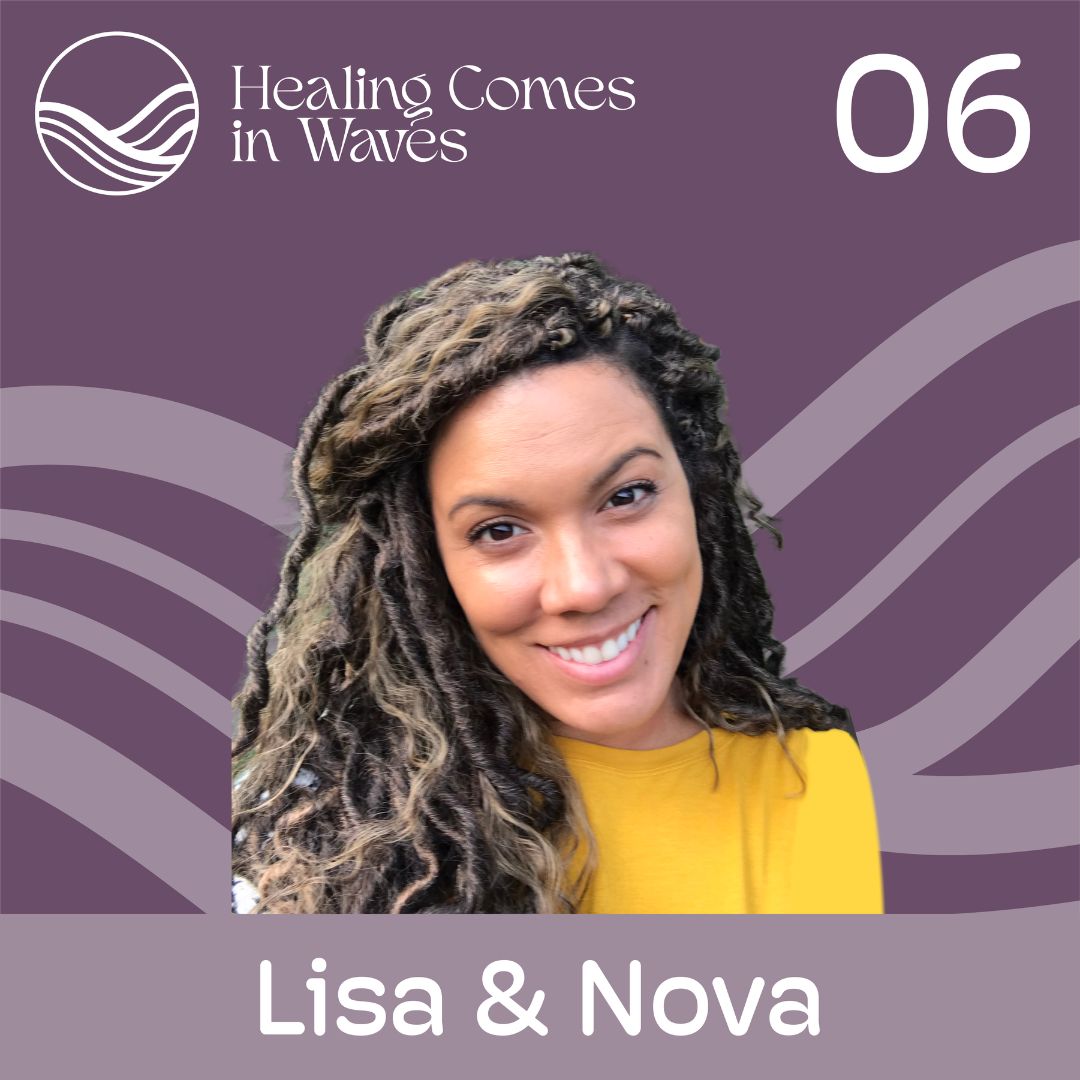
6. Understanding the Neurobiology of Trauma
Many of us hear the word “trauma” used. But what is trauma? How does it impact us? In this episode, we are joined by two brilliant mental health workers: Lisa and Nova Browning Rutherford, to understand trauma and how it affects us after sexual assault. With Lisa, we learn about how trauma shows up in our brains, bodies and nervous systems; with Nova, we talk about the impacts of trauma on our daily life. It’s a heady but gentle exploration of the impact of harm and how we can attend to it.
CONTENT NOTE
There are no descriptions of sexual violence in this podcast series. In this episode, there is a discussion about the impacts of trauma on our brain. This can bring up big feelings and be hard to hear. Listen in a way that feels safer for you. You get to choose.
“Trauma can create such rigidity within us, within our thoughts and our emotions, in the ways our nervous systems respond. And when I thinking of exhaling, I just think of the capacity of our bodies to release and let go and connect with our natural abilities to do that and to be flexible. And so it's just sometimes what healing involves is just allowing that natural intelligence to happen because it is it is there. ”
- Lisa
Since 2009, Nova Browning Rutherford has lectured on the effective actions leaders in the academic, public, and private sectors can take to integrate and promote well-being and equity at work.
Today, Nova serves as a Leadership Development Facilitator in the tech sector. By speaking authentically to the unpolished leadership process, Nova makes it safe for leaders to tell it like it is and draws decision-makers in to focus on solutions and integrate self-care into the calendar as a requirement of optimal performance.
This award-winning speaker has been featured in The Huffington Post, The OWN Network, and national print, online, and TV media outlets.
Lisa is an Indigenous counsellor that specializes in working with survivors of gender-based violence. She has a deep knowledge of attending to the impacts of trauma.
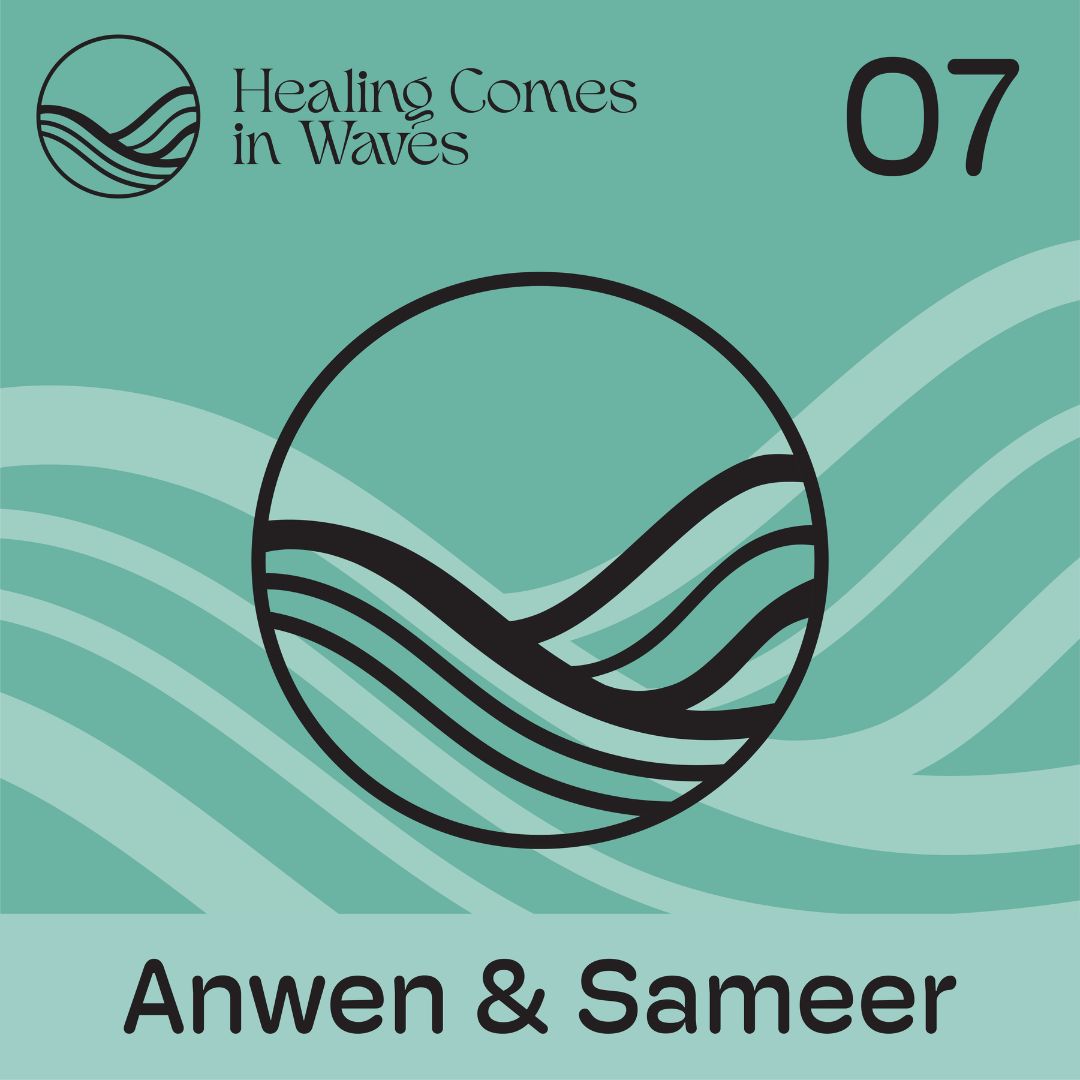
7. Going through a Restorative Justice Process
In this episode, we’re talking with a survivor, Anwen, and the person who sexually assaulted her, Sameer, about going through a restorative justice process. Rarely do we hear stories about survivors finding a sense of accountability, let alone a friendship is borne out of that process. We thought it was important to share this conversation on the podcast to provide a window into other ways sexual violence can be addressed.
CONTENT NOTE
There are no descriptions of sexual violence in this podcast series. This episode is a conversation between a survivor and the person who sexually assaulted her. Hearing them both discuss the impact of a restorative justice process can bring up big feelings and be hard to hear. Listen in a way that feels safer for you. You get to choose.